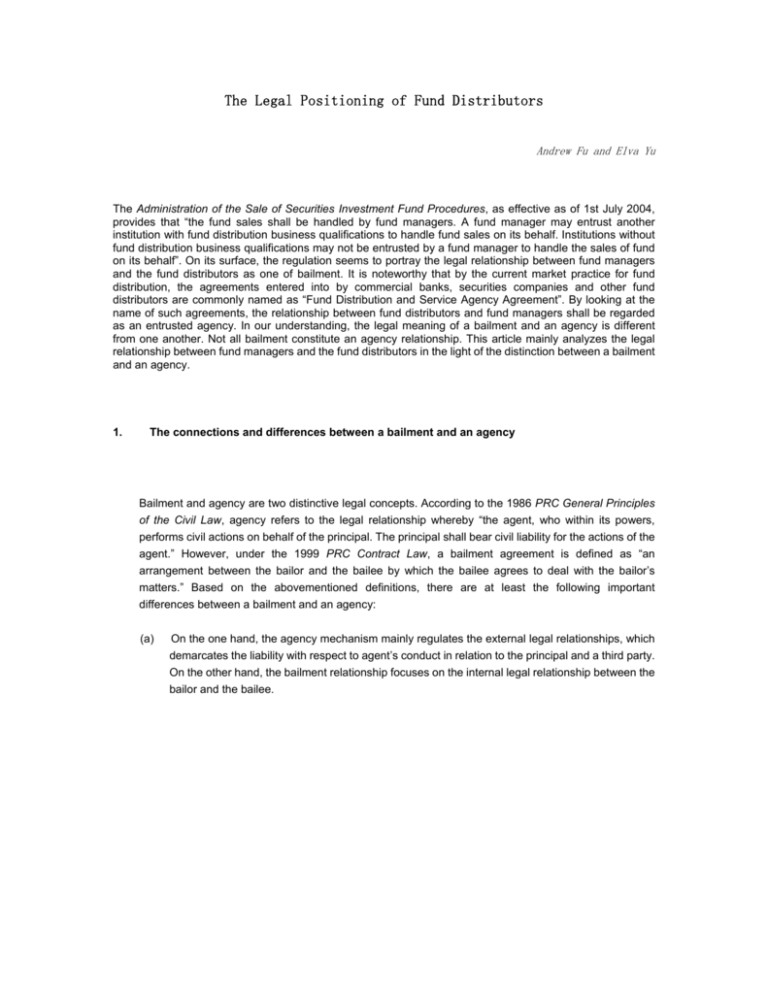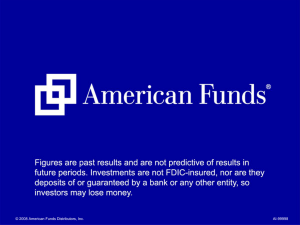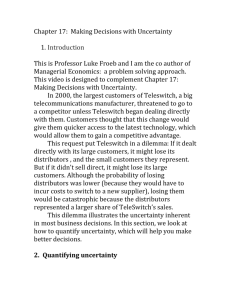The Legal Positioning of Fund Distributors
advertisement

The Legal Positioning of Fund Distributors Andrew Fu and Elva Yu The Administration of the Sale of Securities Investment Fund Procedures, as effective as of 1st July 2004, provides that “the fund sales shall be handled by fund managers. A fund manager may entrust another institution with fund distribution business qualifications to handle fund sales on its behalf. Institutions without fund distribution business qualifications may not be entrusted by a fund manager to handle the sales of fund on its behalf”. On its surface, the regulation seems to portray the legal relationship between fund managers and the fund distributors as one of bailment. It is noteworthy that by the current market practice for fund distribution, the agreements entered into by commercial banks, securities companies and other fund distributors are commonly named as “Fund Distribution and Service Agency Agreement”. By looking at the name of such agreements, the relationship between fund distributors and fund managers shall be regarded as an entrusted agency. In our understanding, the legal meaning of a bailment and an agency is different from one another. Not all bailment constitute an agency relationship. This article mainly analyzes the legal relationship between fund managers and the fund distributors in the light of the distinction between a bailment and an agency. 1. The connections and differences between a bailment and an agency Bailment and agency are two distinctive legal concepts. According to the 1986 PRC General Principles of the Civil Law, agency refers to the legal relationship whereby “the agent, who within its powers, performs civil actions on behalf of the principal. The principal shall bear civil liability for the actions of the agent.” However, under the 1999 PRC Contract Law, a bailment agreement is defined as “an arrangement between the bailor and the bailee by which the bailee agrees to deal with the bailor’s matters.” Based on the abovementioned definitions, there are at least the following important differences between a bailment and an agency: (a) On the one hand, the agency mechanism mainly regulates the external legal relationships, which demarcates the liability with respect to agent’s conduct in relation to the principal and a third party. On the other hand, the bailment relationship focuses on the internal legal relationship between the bailor and the bailee. (b) A major distinction between a bailment and an agency depends on whether the action of the bailee constitutes a legal act. In an agency relationship, the agent performs a legal act where he/she must have his/her own expression or decision-making power (e.g. power to enter in an agreement); whereas, a bailment merely consists of a delegation of certain duties to other party, in which the bailee needs not to have any own expression or decision making power (e.g. taking care of other person’s properties). The act of a bailee can be either a legal act or a non-legal act, depending on the circumstances. Despite the foregoing, there are many connections between the two. The internal relationship between the agent and the principal constitutes a kind of bailment. However, not all bailment are regarded as agency. Generally speaking, a bailment agreement is the foundation for an agency relationship. In the case where a bailment amounts to an agency relationship, given that the bailment agreement, which is usually not disclosed to any third parties, is made between the principal and the agent, hence, a third party may only rely on the principal’s authorization to determine whether the agent has the authority of agency. Authorization is a unilateral legal action that is relatively independent of a bailment relationship, and it constitutes the landmark for the agency. In practice, a bailor may make an authorization within the bailment agreement without having to make another separate authorization agreement. 2. The relationship between fund managers and fund distributors (a) Fund distributors cannot have their own expressions or any decision making power As mentioned above, the bailee’s own expression or decision making power is an absolutely necessary element to constitute an agency relationship. In fund sales, as for investors’ applications to subscribe or purchase or redeem fund shares, fund distributors only accept such investors’ applications in compliance with the terms of the bailment entered into be the fund manager and the distributors. Subsequently, they make a judgment on whether the investors’ application is qualified, and then forward the qualified applications to fund managers. However, fund distributors do not exercise their own expression or decision making power on behalf of fund managers with respect to investors in confirming the validity of the investors’ applications. Investors can only make enquires at fund distributors of the status of those applications after fund managers have decided to accept or refuse the investors’ application. Further, the number of fund shares held by each fund investor shall be quantified in accordance with the records as shown on the TA. The acceptance and handling of the investors’ application by fund distributors does not mean that the investors’ application has already been approved. Therefore, we understand, there is no fund distributors’ own expression or decision making power during the process of the fund sales. (b) Authorization by fund managers Analyzing from many fund sales distribution agreements, although in such agreements, fund distributors are defined as the agents of fund managers, fund managers do not expressly grant fund distributors with any authority of agency. Moreover, it is usually expressly provided in such sales distribution agreements that fund distributors’ acceptance of investors’ application does not represent that fund managers have already confirmed such applications. Thus, it can be said that fund managers do not intend to authorize fund distributors with any authority of agency. From the above analysis, we understand, in the relationship between fund distributors and fund managers, fund distributors do not have any authority of agency granted by fund managers, and have no right to have any own expression or decision making power with respect to any third parties on behalf of fund managers. Fund distributors only act as the bailee of fund managers to handle certain fund sales matters. Thus, it is difficult to define the relationship between fund distributors and fund managers as a legal agency relationship. 3. The legal liability of fund distributors In an agency relationship, the principal bears the legal responsibility for the agent’s conduct as well as being liable for the results of the agent’s own expression or decision making power made to other parties. Based on the above analysis on the legal relation between fund distributors and fund managers, it is followed by a discussion about the legal liability of fund distributors in the activities of fund sales. (a) Transaction application As mentioned above, fund distributors are engaged by fund managers to act as their bailees in receiving investors’ applications and further forward the qualified applications to fund managers. Although fund distributors are not the agents for fund managers, but in the event that fund distributors fail to hand over those qualified applications, the corresponding legal liability towards the investors will be born, under normal circumstances, by fund managers. Yet, fund distributors shall be liable to fund managers in accordance with the bailment agreement. Fund managers shall be liable to investors for their choice of fund distributors. (b) Transaction capitals Fund contracts often include the term that investors’ applications to purchase or to subscribe fund shares shall be effective upon the investors making a full payment transfer. During sales activities, fund distributors usually require investors to make payment into their designated capital accounts. Then, fund distributors shall transfer the purchasing money into a capital clearing account designated by fund managers in a timely manner in accordance with payment milestone set out in the distribution agency agreement. Therefore, below is to analyze the liability of fund distributors during fund transactions in relation to capital payment and transfer. i. Liability of commercial banks acting as fund distributors In the case where a commercial bank assumes the post of the fund distributor, the commercial bank in practice normally requires investors to open an account with them as the capital account for the purpose of fund transaction designated. The abovementioned designated bank account constitutes a legal relationship such as deposit relationship between the investors and the commercial bank, besides the fund sales relationship. When an investor makes an application to the commercial bank for fund transactions, the investor shall simultaneously authorize the commercial bank to transfer the corresponding capital to the fund manager. If the commercial bank fails to transfer the related capital as required by the investor and in turn leads to the investor’s application been denied, the commercial bank’s legal liability in this regard is comparatively complex due to its double identity. In relation to the payment and transfer of capital, we understand, the commercial bank shall act in accordance with the investors’ entrustments. Thus, the commercial bank shall be liable directly to the investors for any late capital transfer committed intentionally or by negligence, and the fund manager shall not be responsible for such late capital transfer. However, because commercial banks are entrusted by fund managers to manage the applications for fund transactions, and furthermore, it is the common belief among investors that fund managers need to be accountable for the activities of commercial banks, hence generating much heated discussion. ii. Liability of other distributors other than commercial banks When other institutions, quite apart from commercial banks, are entrusted as fund distributors, investors will not only directly apply to fund distributors for fund transactions, but also transfer relevant capital to fund distributors from their designated bank accounts (in practice cash is seldom used). In those circumstances, if the fund distributor, upon receipt of the investor’s capital, fails to transfer to or confirm with the fund manager in a timely manner, which causes the investor’s application being denied, then the fund manager shall be liable to the investor. Under such circumstances, in contrast to the commercial banks, there is no bailment relationship regarding capital transfer or payment between investors and fund distributors. iii. Redemption capital In the process of investors’ applying for the redemption of fund shares, fund mangers will transfer the redemption capital into a capital account designated by fund distributors, and then fund distributors will transfer the redemption capital to each investor’s capital account respectively. For redemptions, fund managers have the duty to transfer the redemption capital back to each investor’s bank account, regardless of whether the fund distributors are commercial banks or some other institutions. Therefore, if fund managers authorize any third party to perform such duties and in due course they are not appropriately performed, then the fund managers shall be accountable to the investors. The fund managers may rely on the distribution agency agreement to seek further legal remedies against the fund distributors. The fund managers do not have the defense against the investors by claiming that the failure to transfer the redemption capital is due to the bailee’s intentional act or negligence. In conclusion, even though there is an agreement between the fund distributor and the fund manager, but as the fund manager does not grant any authority of agency to the fund distributor, and the fund distributors does not have any expression of their own or any decision making power in the course of fund distribution, we understand that such fund distributor does not amount to an agent in the strict legal sense. Rather, a fund distributor is merely a person to whom the fund manager has entrusted to perform on its behalf certain specific matters. Essentially, the relationship between the fund manager and the fund distributors can be understood as a bailment contractual relationship, whereby generally speaking the fund manager shall be accountable to the investors regarding matters entrusted to the fund distributors.





